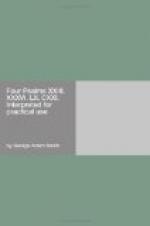To us sin has not become any less of a mystery or a pain. Temptation is as sudden and demonic. Into every soul, however purged and fenced, evil appears to have as much freedom of entrance as God Himself. It begins as early. In the heart of every little child God works, but they who next to God have most right there, the father and the mother, know that something else has had, with God, precedence of themselves. As the years go on, and the knowledge of good and evil grows, becoming ever more jealous and expert a sentinel, it still finds its watch and fence of the outside world mocked by the mysterious upburst of sin within. The whole mystery of temptation is to have sins suggested to us, and to be swept after them by a sudden enthusiasm, which sometimes feels as strong as the Spirit of God ever made in us the enthusiasm for virtue. ’There are moments when our passions speak and decide for us, and we seem to stand by and wonder. They carry in them an inspiration of crime, that in an instant does the work of long premeditation.’[2] ‘An inspiration of crime,’ that is the oracle of sin. From that come the panic and the despair of temptation. The heart, which has still left in it some loyalty to God, is horrified by the ease and the surprise of evil. Yet the greater horror is that this horror may be lost: that men and women do continually exchange it for a complacent and careless temper toward the besetting sin which they have once felt to be worse than death. From being panic-stricken at the rise and surge of temptation, they will (and there is no more marvellous change in all fickle man’s experience) grow easy and scornful about it, time after time permitting it to overcome them, in the delusion that they may reassert themselves when they will, and put it beneath their feet. The rest is certain. Falsehood becomes natural to him who was born loyal, audacity to him who grew up timid and scrupulous. The impulsive lover of good, who has fallen through the very warmth of his nature, develops into the deliberate sensualist. Natures sensitive and enthusiastic grow absolutely empty of power to revolt against what is unjust or foul. A great writer once said of himself in middle life: ’I am proud and intellectual, but forced by the habits of years to like the base and dishonourable from which I formerly revolted.’ Little children have the seeds of all this within them; men and women are born with the inspiration which starts these mysterious and direful changes; the fatal decadence takes place in countless lives.
[Footnote 2: George Eliot.]
Before facts so horrifying—they are within as well as everywhere around us—our real need is not an intellectual explanation of why they are permitted or whence this taint in the race arose. For, supposing that we were capable of understanding this, the probability is that we might become tolerant of the facts themselves, and, perceiving that cruelty and sin had a necessary place in the universe, lose




